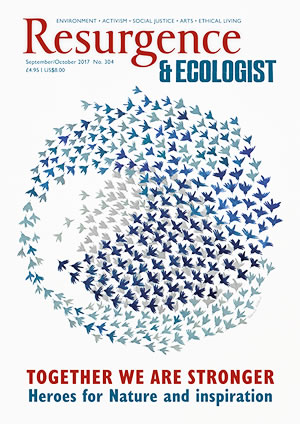This book is a really important contribution to a newly emerging global phenomenon: the rediscovery of the sacred through and in the rituals, beliefs and values that surround our complex relationship with food and food production.
Through a series of articles and essays – some quite academic, others much more narrative and story – we are taken on a wonderful and hopeful journey. From Peru to Hawaii, from Nepal to Israel, from Northwest Ohio to Egypt, we are introduced to fascinating people, beliefs, programmes and ideas. Some start with a personal story. For example, in what could have been a rather dense if earnest article, ‘Soils, Spirits, and the Cosmocentric Economy’, the author, Frédérique Apffel-Marglin, is told how elders of Indigenous farmers in the high Amazon of Peru used to offer broken pieces of ceramics to Mama Allpa (Mother Earth).
What all these articles share is an enthusiasm for the role spirituality – let’s be bold and actually say the R-word – religions and faiths can play in returning us to a sense of our place within Nature. They all challenge the notion that we are apart from Nature and ask what this must mean for our relationship with the production of food.
Sadly, as its title – and those of many of the articles within it – shows, this book is trying to be academic when actually the last thing the world needs is more academic books. What is exciting is that it fails to be academic because it actually has such fascinating stories to tell. I would encourage anyone concerned with how culture, traditions, religion and faith can make a real difference to the future, not just of agriculture, but also of life on Earth, to read this book. I would also encourage the editors to consider producing a shorter volume of the key stories and things we can all do to make farming more compassionate.
The truth is that we are going to have to find better ways of farming. We need to rediscover roots that come from our past that can help us ground ourselves for today and beyond. We also need to confront a data world that does not understand that data is only as good as the story that uses it. We need to return to narrative to inspire us against those whose only worldview is money and numbers.
The struggle for a real relationship with the soil is not just some nice New Age fad. It is critical if we are to find beliefs, actual sustainable farming methods, values and an ethos that really reconnect us to soil and Nature.
What this book also highlights is that despite its title, ethics has nothing to do with this except in a very abstruse way. What so many of the articles and essays show is that faith, spirituality and culture create an ethos. It doesn’t tell you what is right and wrong. It brings you up in a tradition that shows you how to respect the stranger; how to celebrate with food; how to mark the key stages of human life; how to honour Nature. It does this through the way you share food together. The way you respect and honour the land. How you see yourself as part of a greater story.
Time and time again in this book we are taken deep into such ethos and lifestyles. Here is where the future lies, and this book offers a fascinating series of journeys in time, place, faith and hope.






